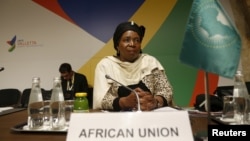The five-way contest for the African Union’s top job is a packed field, with four foreign ministers and a U.N. special envoy.
Current AU Commission Chairwoman Nkosazana Dlamini-Zuma, of South Africa, took the job in 2012. She is on borrowed time after heads of state extended her four-year term by six months over indecision about her successor.
That person is to be chosen by African heads of state as they meet next week at for this year's summit AU headquarters.
“It’s a very important job,” said analyst Liesl Louw-Vaudran of the Pretoria-based Institute of Security Studies. “The chairperson of the commission has to really run the day-to-day workings of the commission in Addis Ababa, formulate policy, carry it out. There are eight commissioners that range from peace and security to social affairs, et cetera. There are about, over 2,000 staff, not that big, but the chairperson really is the only pan-African position that we have.”
Pan Africa
Switching to a pan-African perspective will undoubtedly be a shift for the four current foreign ministers, Botswana’s Pelonomi Venson-Moitoi, Chad’s Moussa Faki Mahamat, Equatorial Guinea’s Agapito Mba Mokuy and Kenya’s Amina Mohamed.
But analyst and open society advocate Jeggan Grey-Johnson says leading the AU commission requires the chairperson to rise above borders and advocate for the entire continent, and sometimes, even against the interests of the powerful leaders who put him or her in the job.
“The ideal candidate would be one that we know is relatively independent, hasn’t been tainted by either their reputation that they’ve had in previous positions, whether it’s minister, whether it’s prime minister, whether it’s a special envoy or whatever, that has not been captured by the legacy of the loyalties that they might have had to their presidents when they were actually serving at their pleasure,” he told VOA in Johannesburg.
“…The fact that the assembly of the heads of state sometimes can be quite unreasonable, some of the things that they want to do, and it would be good to maybe have a chairperson who for once, also might stand up to the assembly in a reasonable manner.”
Candidates debate
All five candidates, who include Senegal’s Abdoulaye Bathily, the U.N. Special Representative for Central Africa, appeared to embody this ideal during a well-attended debate at AU headquarters in December.
Each spelled out a list of ambitious and expansive priorities, which included: building peace and security, improving the situation of African youth and of women, increasing employment opportunities, finding a more stable way to finance the AU, adjusting to the challenges of climate change, and fighting the HIV epidemic and the African migration crisis.
This is the first time such a debate has happened, and regardless of the victor, politics and international studies professor Cheryl Hendricks of the University of Johannesburg says it alone is significant.
“I think it’s a very good thing for the people of Africa,” she said. “Before, nobody knew who the candidates were, if you weren’t part of the (inner) circle. We are all now following these various candidates, we are all commenting on them, even though what we say may not influence how our heads of state vote, at least we are all having our say, and I think that is commendable.”
VOA News asked all three AU watchers who they thought the winner would be.
Each gave a well-reasoned argument, and a completely different answer in which no single candidate emerged. And each acknowledged the realpolitik of the AU commission, the post informally rotates among the five regions of Africa, and each African head of state is naturally seeking to promote his or her region.
Furthermore, the heads of state will choose the commissioners, and the scramble for those eight high-level spots could also be a game of geographical musical chairs that could shift the balance for the top job.
“But you know, you never know with the AU,” Louw-Vaudran said. “It’s a secret vote, heads of state make that decision, there’s a lot of give and take on various issues. And so, it’s very difficult to guess who’s going to win this race.”











